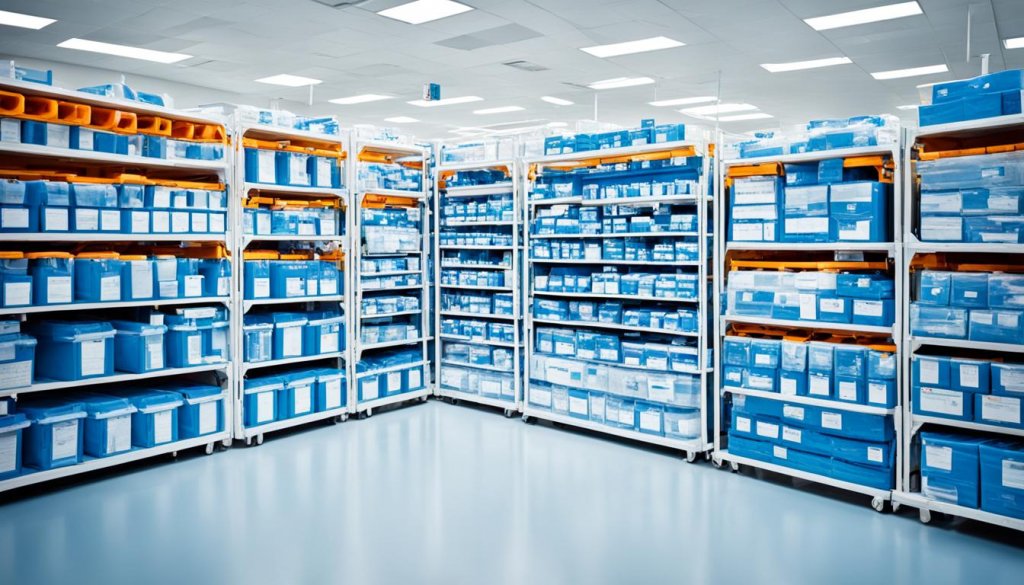Being a medical equipment business owner, I’ve learned finding the right suppliers is crucial. It’s not only about getting top-quality items. It’s also about making sure they meet the rules, keep costs down, and help your business succeed. Checking suppliers thoroughly is key for reaching these important goals.
Choosing the right vendors is vital for your medical device projects. They influence everything from how fast you get your products to safety. It’s crucial to pick the right fit vendor to ensure your project’s success.

Maren Nelson is a leader in developing medical products and quality systems. She has created many devices in her career, working with teams both inside and outside the company. Now, she advises on making strategies for medical products and enhancing quality systems. Her insights are valuable for choosing the best medical device suppliers.
Key Takeaways
- Identifying the right suppliers is crucial for ensuring quality medical products, regulatory compliance, and cost-effectiveness.
- The supplier vetting process involves evaluating factors like capabilities, manufacturing processes, and intellectual property protection.
- Assessing a supplier’s project management, including their quality system documentation and client management, is essential.
- Understanding a supplier’s influence on product development, supply chain management, and environmental conditions is important.
- Ensuring regulatory compliance, such as adherence to FDA Quality System Regulations and ISO 13485, is a critical consideration.
Importance of Selecting the Right Suppliers
For medical equipment businesses, picking the right suppliers is key. It ensures top product quality, meets rules, and saves money. The suppliers you pick hugely affect your business’s success.
Impact on Product Quality
Choosing the correct suppliers is vital for your medical device’s success and your profits. They affect how fast products arrive, the risks they pose, and their total quality. So, you must choose the right supplier for your project carefully.
Regulatory Compliance Considerations
To meet standards, your project needs compliant parts and services. As a medical company, you must manage suppliers according to the rules. These rules come from the accrediting body in your area. For instance, in Europe, you’d use ISO 13485. In the US, the US FDA’s rules apply. They guide how you handle suppliers.
Cost-Effectiveness and Profitability
Your business’s money and success also depend a lot on your suppliers. Building a trusting, transparent relationship with them is crucial. It can help you get cheaper supplies without hurting innovation or workflow. Knowing your supplier’s costs can help you ensure they grow with you while keeping quality.

Establishing Supplier Selection Criteria
Finding the right medical suppliers
for your company is key. First, make a list of possible suppliers for your medical devices. Then, short-list the best options for your project. This can include multiple choices for the same item or service.
Capabilities and Expertise
Start by looking at the supplier’s accreditations. But, these are only good if the supplier can actually make what you need. Some items may be easy to find, but others might need special development. Make sure the supplier can meet your product’s needs.
Manufacturing Processes and Certifications
Check the vendor’s manufacturing methods and if they meet industry and legal standards. It’s good if they’re audited by the FDA and are 13485 certified. This shows they aim for high quality and follow regulatory compliance for medical suppliers. So, the quality medical products they offer should be what you’re looking for.
Intellectual Property Protection
Expert Maren Nelson highlights the importance of who owns the project’s intellectual property. The medical company is the one responsible to regulators, not its suppliers. So, sorting out who owns what is essential to protect your company.
Evaluating Suppliers’ Project Management
When looking at medical suppliers, it’s key to check their project management skills. This means looking into their quality system documentation, project planning and execution, and client management and feedback structure.
Quality System Documentation
Make sure the vendor you pick for your medical device project has a documented quality system. This ensures the reliability of their medical products and their compliance with rules.
Project Planning and Execution
Examine how the supplier carries out and oversees their projects. Look for signs of an organized project plan. This includes visible timelines, resource distribution, and ways to handle risks. Understanding this can show how well they can deliver quality medical products on schedule and within budget.
Client Management and Feedback Structure
Check how the supplier handles clients and their feedback. Do they have a way to spot and deal with client issues? Are they quick to respond to your needs and suggestions? A solid client management system shows they are a reliable medical supplier focused on getting better and keeping clients happy in the healthcare supply chain.
Assessing Supplier Influence and Location
Knowing your potential suppliers’ influence and location is key in the healthcare supply chain. If the vendor company has to innovate or follow your specifics, having influence helps. This is also true for creating new medical devices.
Having a say in product development can cut costs and boost quality. It leads to better lead times and increased access to new tech.
Supply Chain Management and Delivery Schedules
The place of your suppliers matters in big medical device projects. How well they manage their supply chain can directly affect you. Will they ensure your materials arrive on time? What’s their plan if things go wrong?
It’s vital to know how they deal with production delays and their delivery schedules. Can they meet your product needs monthly? Proximity, their ease of access, and their supply chain skill all impact getting medical supplies on time and at a good price.
Environmental Conditions for Storage and Transportation
Looking at supply chain management is not enough; you must also check if they can keep your medical products in the right conditions. For items that need specific temperatures, this is crucial.
Ensure your suppliers have the right facilities and processes for keeping your medical equipment safe. This helps keep your equipment in top shape, making your medical supplies sourcing both cost-effective and reliable.
Understanding Cost Structures and Scalability
Being a medical equipment business owner, knowing your supplier’s cost structures and scalability is key. Suppliers are often quiet about their costs to avoid price pressures. Establishing trust and transparency with your suppliers can give you insight into their pricing. This makes it easier to negotiate lower prices without hurting their business.
It’s also crucial to understand how well your supplier can grow with your needs. Can they keep up with increasing demands while ensuring quality? It’s important to know both your and your vendor’s responsibilities as mentioned in the contract. This helps prevent future problems. Plus, it aids in smart risk management, helping you choose the best suppliers for your business.
Reviewing Legal Requirements and Contracts
When choosing suppliers for your medical equipment business, it’s vital to check the laws and contracts closely. This ensures you know what’s required and can keep everyone’s expectations clear.
The vendor contracts should cover what work needs to be done, when it’s due, how much you’ll pay, and what happens if things go wrong. This includes how either side can end the agreement. Make sure you also understand the penalties for not meeting the legal parts of the contract.
Scope of Work and Deliverables
The agreement should clearly state what work needs to be done and what results you expect. This makes sure both you and the supplier know exactly what’s needed. It lays the groundwork for a successful partnership.
Termination and Consequences
It’s important to know when and how the contract can end. You should also understand the fallout if either side breaks the rules. This helps you prepare for any risks that might come up.
Going through the legal and contract details for each potential supplier is key. It allows you to compare their offerings, prices, quality, and more. This comparison helps choose the right supplier for your medical equipment business.
Right Suppliers for Your Medical Equipment Business
Finding the best suppliers for your medical equipment business is key. Begin by looking at what suppliers your competitors use. This way, you can learn about the market and find good suppliers that meet your needs and standards.
Evaluating Competitors
Research your rivals and the suppliers they choose. Look at the quality of the products, how quickly they’re delivered, and if customers are happy. This info helps you see if their suppliers might work for you. The right suppliers are crucial for your products’ quality, following regulations, and saving money.
Periodic Supplier Performance Review
After you’ve picked your suppliers, check up on them now and then. Look at how they do with delivering on time, their product quality, and how well they meet your needs. Make sure they still fit what you’re looking for or if it’s time to switch some out. Keeping a good watch on your suppliers will help your business stay strong.
Regulatory Compliance in Supplier Selection
Being in the medical equipment field, picking the right suppliers is crucial. It ensures that all your work meets the rules set by official groups. These rules go for the parts, services, and systems in your projects.
For work in the US, you’ve got to follow the FDA’s Quality System Regulations. If you’re in Europe, it’s important to stick to the ISO 13485 standard. This is all about making sure your medical devices are top-notch.
FDA Quality System Regulations
In the US, the FDA’s QSR spells out how to work with suppliers. It involves picking suppliers well, checking them out well, and keeping good records. All this helps make sure your suppliers meet the right standards, keeping your projects up to scratch.
ISO 13485 for Medical Device Quality Management
In Europe, the ISO 13485 standard is key. It guides you on how to manage suppliers, requiring you to look closely at what they do. Working with suppliers who meet ISO 13485 boosts your project’s quality and compliance efforts.
Establishing Formal Agreements and Contracts
Choosing a manufacturing partner for your medical equipment business takes a lot of effort. You need to set the criteria and gather info on how a partner will meet it. After that, it’s crucial to put everything in a formal document or contract. This way, you keep a legal record of the criteria and quality expectations for your supplier vetting process.
Quality Expectations and Criteria
The agreement should clearly lay out what’s expected, including quality standards and specific goals. By doing this, it makes sure both you and your partner are in line with regulatory compliance for suppliers and the creation of quality medical products. This document acts as a guide for your partnership, showing who does what and to what standards.
Ownership Clarification
Understand this: the real owner of the medical product is the entity that takes responsibility, not the parts’ suppliers. So, the medical company is seen as the main maker by the authorities, even if the actual making is outsourced. It’s key to sort out who owns the intellectual property at the start.
Escalation and Change Management
Moreover, the agreement needs to say how often you’ll check on the partnership and how to deal with problems and changes. This step helps deal with any issues fast and fair, safeguarding both the medical company and the supplier during making and development.
Conclusion
Finding the right suppliers is key for a medical equipment business to thrive. It’s about getting quality medical products and following regulatory compliance. Also, it involves scoring cost-effective medical supplies. This requires setting clear criteria and checking suppliers’ project skills. You also must look at their reach and understand their prices.
Expert Maren Nelson’s advice on sourcing medical devices and setting up solid quality management systems is priceless. She helped me tackle finding the right suppliers and making sure they follow the rules. Her tips on making agreements, defining who owns what, and setting up rules for changes have guided me well. This has made my search for the right suppliers for my medical equipment business much easier.
The future of my medical device plan and my business’ success rely on picking the right vendors. Thanks to the advice in this article, I believe I know how to work the healthcare supply chain. This should help me find reliable, rule-following, and affordable suppliers. With these strategies, I aim to provide my customers with quality medical products.
See how FieldAx can transform your Field Operations.
Try it today! Book Demo
You are one click away from your customized FieldAx Demo!
FAQ
What are the key considerations when selecting suppliers for a medical equipment business?
As a medical equipment business owner, selecting the right suppliers is vital. This ensures you get quality products, meet laws, and save money. It’s crucial to thoroughly check out your suppliers. This will help your project and your finances.
How do suppliers impact the operations of a medical equipment business?
Choosing the right vendors is essential for your project and its success. The suppliers’ lead times and safety are critical for your operations. It’s essential to find the best vendor for your medical device project.
What insights does Maren Nelson, an expert in medical product development, provide on supplier selection?
Maren Nelson has a wealth of experience in making medical devices. She advises on how to choose good suppliers in medical product development. Her insights can guide you to the best practices in supplier selection.
What are the key steps in the supplier vetting process for medical equipment businesses?
Make a list of vendors and then narrow it down. Look at their experience, quality, and if they meet regulations. Check their production capacity and how they manage projects.
Why is supplier influence and location important in the medical equipment industry?
Vendor influence can lower costs and improve quality in your product’s development. It can also speed up the process and bring new technology to your project. The supplier’s location and their supply chain control affect your project’s timing and environmental needs.
How can understanding a supplier’s cost structure benefit a medical equipment business?
Building trust with your vendor and understanding their costs is key. It can lead to better prices for you, without hurts innovation and production. This insight also helps you see how well the vendor can grow with your needs.
What legal requirements should medical equipment businesses be aware of when working with suppliers?
Know the legal stuff, like what’s in the agreement, when and how they’ll deliver, and payment details. Understand also how the agreement can be stopped and what happens if rules aren’t followed. This can prevent future arguments and deal with risks better.
How should medical equipment businesses evaluate and monitor their suppliers over time?
After picking the best suppliers, keep an eye on them regularly to make sure they still fit your needs. Shift out any who don’t perform well and add in better ones.
What are the key regulatory compliance considerations for medical equipment suppliers?
To follow the law, everything in your medical device project must meet certain standards. For example, in the US, you must adhere to the FDA’s rules, while in Europe, it’s ISO 13485. This is crucial for your project’s success.
What should be included in formal agreements with medical equipment suppliers?
Your agreement should detail what you expect, quality standards, who owns what, and the project milestones. Also, it should say how often it’s checked and ways to adjust the agreement. Make sure to cover who owns any new ideas from the start.
Author Bio
Co-Founder & CMO at Merfantz Technologies Pvt Ltd | Marketing Manager for FieldAx Field Service Software | Salesforce All-Star Ranger and Community Contributor | Salesforce Content Creation for Knowledge Sharing






